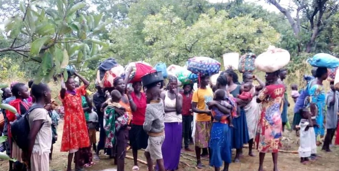Thousands of residents have returned to Western Equatoria State’s Nagero County after a relatively calm period in the area following heavy fighting that erupted on 28 September between SPLM-IO and government forces.
The clashes left more than 15 people dead, including civilians and soldiers, while many others were wounded.
Acting Commissioner Gabriel Bernado says over 13,000 civilians have returned, but many are still hiding, fearing renewed attacks. Returnees are now living in overcrowded schools, hospitals, police stations, and government offices, often without food, shelter, medicines, or cooking utensils.
“All our food was destroyed, hospitals and homes were damaged, and people are sleeping like goats. Roads to Wau and Tambura remain blocked,” he lamented. “There are no mosquito nets, and pregnant women and children have no access to medicines.”
Youth leader Mambu Juma said residents face extreme difficulties accessing water and food.
“There is only one borehole inside an army barracks, and women fear fetching water,” he explained. “Children are sick with diarrhoea, and people cannot go to their farms. We urgently need food, medicines, and support.”
Community elders also appealed for immediate relief, warning that the rainy season and lack of shelters worsen the situation.
“All our household items were looted or destroyed during the fighting,” said Joseph Lindro Kau. “People have no shelters, no food, and urgent support is needed before the situation becomes worse.”
Meanwhile, James Abdallah Aruna, the state’s health minister and acting information minister, said the government is preparing to deploy security forces and working with the South Sudan Red Cross to deliver aid to Nagero County.
“We are making arrangements to ensure calm returns fully and services reach the people,” he said.
The authorities report that while the security situation has improved, basic services remain unavailable. Residents continue to sleep in crowded government buildings and schools, facing cold weather, flies, and a lack of sanitation. Women and children are particularly vulnerable.
Returnees and community leaders are appealing to the government, humanitarian organizations, and development partners to deliver urgent support, including food, medicines, shelters, and water, to help them rebuild their lives.
Radio Tamazuj will continue monitoring the situation in Nagero County and provide updates on the plight of internally displaced persons.




